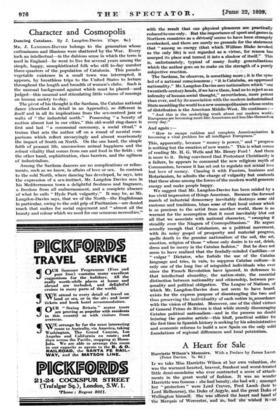Character and Cosmopolis
Dancing Catalans. By J. Langdon-Davies. (Cape. 6s.) Ma. J. LANGDON-DAVIES belongs to the generation whose enthusiasms and illusions were shattered by the War. Every inch an intellectual—in the dubious sense in which the term is used in England—he went to live for several years among the simple, happy, unsophisticated folk who still to-day number three-quarters of the population of Catalonia. This pseudo- vegetable existence in a small town was interrupted, it appears, by breathless trips to the United States to lecture throughout the length and breadth of women's dubs. Such is the unusual background against which must be placed—and judged—this unusual and stimulating little volume of musings on human society to-day.
The pivot of his thought is the Sardana, the Catalan national dance (described in detail in an Appendix), so different in itself and in all its implications from the sex-centred jazz or waltz of " the industrial north." Possessing " a beauty of motion almost lost in our cities," this old-world ring-dance is first and last " a communal ceremony, a social ritual," a truism that sets the author off on a round of mental com- parisons which reflect unvaryingly and almost wearisomely the impact of South on North. On the one hand, the simple faith of peasant life, unconscious animal happiness and the robust vitality that comes from sun and food in the fields ; on the other hand, sophistication, class barriers, and the ugliness of industrialism.
Among the Sardana dancers are no complications or refine- ments, such as we know, in affairs of love or sex. In contrast 'to the cold North, where dancing has developed, he says, into the expression of a sex-instinct, Mr. Langdon Davies sees in his Mediterranean town a delightful freshness and fragrance, a freedom from all embarrassment, and a complete absence of what he calls " Hyde Park vulgarity." It may be, as Mr. Langdon-Davies says, that we of the North—the Englishman in particular, owing to the cold grip of Puritanism—are denied much that makes for social enjoyment and " almost all the beauty and colour which we need for our sensuous necessities," with the result that our physical pleasures are practically
reduced to one only. But the importance of sport and games in Northern countries as a derivatif seems to have been strangely
overlooked, and there are surely no grounds for the statement that " among us energy (that which William Blake invoked as the only life) is not regarded as a virtue, for reason has usurped its place and turned it into a shadow of itself." This is, unfortunately, typical of many faulty generalizations which the author goes on to make on the strength of a purely subjective reaction.
The Sardana, he observes, is something more ; it is the sym.
bol of a national consciousness ; "it is Cataltula, an oppressed nationality." Mr. Langdon-Davies sees nationalism which " our twentieth-century heads, if we have them, lead us to reject as an infirmity of human social thought," nevertheless, more potent than ever, and by its association with the modern industrialized State moulding the world to a new cosmopolitanism whose centre of distribution is the American Middle-West. He continues :-
" And this is the underlying truth about our modern world: Europeans are becoming more like Americans and less like themselves every day."
And again :— " How to escape ruthless and complete Americanization is becoming a vital problem for all intelligent Europeans."
This, apparently, because " money is power," and " progress is nothing but the creation of new wants." This is what comes of reading Mr. H. G. Wells and Mr. Henry Ford ! And there is more to it. Being convinced that Protestant Christianity is a failure, he appears to commend the new religious myth of Communism, because it has set out to regulate not sexual love but love of money. Classing it with Fascism, business and Rotarianism, he admits the charge of vulgarity but contends that these alone among the forces of the modem world generate energy and make people happy.
We suggest that Mr. Langdon-Davies has been misled by a too vivid impression of things American. Because the forward
march of industrial democracy inevitably destroys some old customs and traditions, blurs some of that local colour which
is so precious to the artist from another world, there is no warrant for the assumption that it must inevitably blot out all that we associate with national character, " sweeping it steadily over the Niagara of Cosmopolitanism." He argues soundly enough that Catalanism, as a political movement, with its noisy gospel of prosperity and material progress, spells death to the genuine nationalism of the soil, the art, emotion, religion of those " whose only desire is to eat, drink, dress and be merry in the Catalan fashion." But he does not seem to have realized that the feudally-minded Castilian—or " vulgar " Dictator, who forbids the use of the Catalan language and tries, in vain, to suppress Catalan culture—is
only one of the long line of misguided individuals who ever since the French Revolution have ignored, in deference to
that intellectual absurdity, the nation-state, the essential distinction between nationality and citizenship, between per- sonality and political obligation. The League of Nations, of
which Mr. Langdon-Davies does not seem to have heard, exists for the express purpose of disentangling the two and thus preserving the individuality of each nation int,accordanee
with the vision of Mazzini. Moreover, one of the chief virtues of General Primo de Rivera is that while sternly discouraging Catalan political nationalism—and in the process no doubt injuring the genuine article—this bluff, practical soldier for the first time in Spanish history is seeking by his administrative and economic reforms to build a new Spain on the only solid foundations of regional differences and local patriotism.












































 Previous page
Previous page